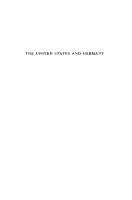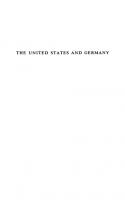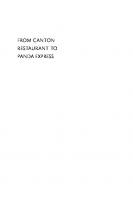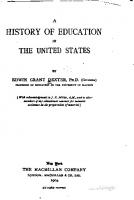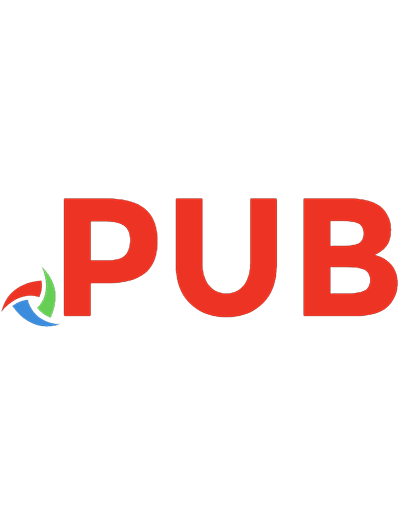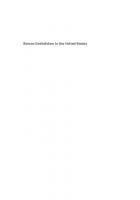Charles Daniel Ebeling, who from 1793 to 1816 published in Germany a geography and history of the United States in seven volumes
282 97 586KB
English Pages [15] Year 1929
Polecaj historie
Citation preview
Charles 2>amel Ebeling, mbo from 1793
1816 ipubltsfceo in Germans a (Beograpty) ano 1bteton> of tbe TUniteo States in Seven IDolumes to
HON. CHARLES
I.
LANDIS, LL.D.
Read before the Pennsylvania German Society at Lancaster, October
LANCASTER, 1929
PA.
9,
1925
N
1690 there was published in London by William \J Penn a "Proposal for Second Settlement in the Province of Pennsylvania," and it in part read: "Whereas, I did about nine years past propound the selling of several parts or shares of land upon that side of the Province of Pennsylvania, next Delaware River, and setting out of a
upon
place
it
for the building of a city
by the name
of
Philadelphia, and that divers persons closed with those proposals,
who by
and charge, good forward-
their ingenuity, industry
have advanced that city from a wood to a ness of building. ... It is now my purpose to make another settlement upon the River Susquehanna, that runs into the Bay of Chesapeake, and bears about fifty miles west from the River Delaware in America. There I design to lay out a plot for the building of another city in the most convenient place for communication with the former plantations on the east, which by land is as good as done already, a way being laid out between the two rivers exactly and conveniently at least three years ago.
.
.
."
This intended plan was not consummated by William Penn in his lifetime, and I do not pretend that the City of Lancaster was the exact location contemplated by him at that time; but as the new city was to be established hereabouts, it may be fairly concluded that his ideas and is
The Pennsylvania German Society
16
intentions were with reasonable certainty carried out,
when subsequently Andrew Hamilton and out this ancient town.
Hamilton,
laid
membered
that Lancaster was the
some time
first
James must be relarge town west his son,
It
appeared in the old geographies as the largest inland city in the United States. It was, therefore, fitting that here in the midst of a population made up largely of descendants of German settlers, and in a place which may not inaptly be said to have been contemplated by the founder of the colony, this Society should have, on April 15, 1891, had its birth. Some of its promoters were Egle, Stahr, Hark, Lyte, Baer, Albright, Heilman, Diffenderffer, Pennypacker, Sachse, and others of equal prominence. I think all of the thirty-one who then assembled, except Dr. Hark, Dr. deSchweinitz and Rev. Jeremiah Hess, have gone to their long reward. They for many years maintained in dignity and strength the organization, and they and their associates placed upon the records of history much that but for them might have been forever lost. Unfortunately you for the last few years have felt the baneful effects of the Great War, and your activities have been thereby to some extent suspended. I conceive, however, that you are starting to recover the lost ground,
of Philadelphia,
and
for
it
and that the men who are now guiding the society are putting their shoulders to the wheel, and that their interest in this work will produce additional success.
A
recent president of our Society has whimsically said
that there are no other duties attached to the office of president but the delivery of the annual address, and
while according to the curriculum this
may
be to a con-
siderable extent a true proposition, yet outside of
there
ways in which this officer can make himself Of necessity, such addresses are generally per-
are a few useful.
it
Charles Daniel Ebeling
17
Having stated the purposes of the society, the objects accomplished and the hopes for the future, You have heard these the theme is well nigh exhausted. topics fully discussed in the past, and I, therefore, beg to be relieved from their repetition. I am hampered by the sense that I am not much of an historian, and I realize that what I am attempting to do could be better done by functory.
many whom
around about me. Many years ago, the German Herder said: "Write the biographies of your great men, ye silent, backward, Germans," and it is my purpose to briefly sketch the life of a German who by his labor in the collecting of American History
Some but
little
this I
see sitting
Temple of Fame. you may be familiar with him and his work, as yet has been inscribed upon the records. In
is
of
I
entitled to a niche in the
but lead the way for the
follow along the
same path.
real historians,
The name
of this
who may
man was
Christoph Daniel Ebeling. He was born at Garnissen, near Hildescheim, in Hanover, Germany, on November 20, in the year 1741. He studied theology in the University of Goettingen in 1763-1767, and then directed his attention
to
geography and polite
literature. In he became a private tutor in Leipzig, and he went 1767, to Hamburg in 1769 and became a teacher in the Handlungsacademie. Here his historical and geographical attainments won the recognition and friendship of the
history,
Hamburg
In 1770, he came into intimate relaG. Busching. In 1784 he was made Professor
literati.
tion with J. of History and
Greek in the Hamburg Gymnasium, and in 1799 he became Provisory Librarian of the Stadtbibliotek, in which position he rendered conspicuous service in the matter of cataloguing.
From
1793
to
he published his Geography and History of the United States, in seven volumes, it forming a continua1
8 16,
2
The Pennsylvania German Society
18
Geography. The first six books were printed by Carl Ernst Boh, in Hamburg, and the last by Hoffman and Campe of the same place. He dedicated his work to "His Friends, Boght and Seiveling ... to show his thankfulness for the assistance which they gave him in securing the information concerning America." The First Volume (1793) covers New England, Massachusetts and New Hampshire; the Second Volume (1794) Rhode Island, Connecticut, Vermont and New York; the Third Volume (1796) New York and New Jersey; the Fourth Volume (1797) Pennsylvania; the Fifth Volume (1799) Delaware and Maryland; the Sixth Volume (1803) Pennsylvania; and the Seventh Volume (1816) Virginia. tion of Busching's General Descriptive
In the Preface to Volume
1
of his History, he apologized
and then set forth his plan and its execution. He made the first announcement of his purpose to write about the English Colonies in 1776 in the preface to his translation of Burnaby's Travels, but he had then to depend entirely on the books of English writers, for he had not access to American for the late appearance of his book,
sources.
more
The Revolutionary War made
difficult,
and only
after peace
his
task
still
was concluded did he
begin his description of the free states de novo. regretted that he lacked the speed with which
He
Von Moser
octavo volumes on North America, and said that the United States had as yet no Busching that Morse did something, but he had a poor opinion of him as an authority, although his third edition was said to be a great improvement over the preceding editions. The first volume of Ebeling's History is the 13th volume of Busching's Descriptive Geography, to which Ebeling had pledged himself to furnish the section on North America. He stated that, lest readers might be deterred
brought out
his three
Charles Daniel Ebeling
19
from buying so voluminous a work, he assured them that no single state history, not even Pennsylvania and Virginia, would be so copious as Massachusetts, and that the Geographies of many of the States, as Connecticut, Rhode Island, Vermont, New Jersey, Delaware, Kentucky, North Carolina and Georgia, were not nearly so rich in material as that of Massachusetts, which in all respects was remarkable. His critical revisions of musical works were highly prized and were printed in the "Hamburger Unterhaltungen" and were extensively used by Gerber. In 1794, Joel Barlow, who was then the American Consul at Hamburg, wrote to President Ezra Stiles, of Yale College, the following letter:
"Hamburgh, " Afy dear
and much
27
May,
1794.
respected Sir:
"Permit me to ask your attention to a subject which, I am sure, will give you some pleasure in compensation for the trouble it may cost you. Mr. Professor Ebeling, a gentleman of great eminence in literature, philosophy and republican principles, has undertaken a work entitled The Geography and History of the United States. It will be in five or six volumes.
He
has
you herewith the
made such first
progress as to be able to send
volume.
You know
that the genuine
sources of information, especially with respect to our state,
few that exist are hard to come at In his letter, which accompanies this, he will tell his own story, and point out to you the articles which he wants. He will likewise mention those which he has already by him, in order to enlighten your discretion in furnishing him with s uch others as you may think proper besides those he mentions by name. Mr. Isaac Beers, to whom we likewise write, will assist you and consult with you on the subject. He is furnished with the means of payment. are rare,
and some
of those
for a person at this distance.
The Pennsylvania German Society
20
"Every such attempt
to instruct the European world in whatever concerns America deserves our warmest encouragement, as it serves to induce the oppressed of all nations to come to us: a migration which at once augments our prosperity and their felicity. And I know no man who possesses more ability and inclination to serve the cause of humanity in this way, than he whom I have the honour to recommend to your
correspondence.
"It
to be regretted that the difference of language has
is
placed such a barrier as
it
has between us and the
German
We
have been content to borrow from them their science, without being able to relish the beauties of their writers. These are more numerous, and perhaps more excellent, than those of any other modern nation. literature.
improvements
We
in
have, for some reason or other, neglected to cultivate their
language,
or
translate
authors in this town,
poet
their
difference of opinion
Paradise Lost. age, he
mounts
with as
much
the
much
superior to him.
This
doubtless owing to the badness of the
we read the Messiah, and
This charming a horseback like a
fire
good
as
Germans think
we think Milton
is
translations in which
other
have the pleasure of knowing the great
I
KLOPSTOCK, whom
superior to Milton, as
"Among
works.
man
is
they, the
near eighty years of
young man, and makes
odes,
as Collins.
"I hope to have the pleasure of seeing you and my dear country in the course of next year, and am in the mean time with great respect and veneration,
"Your obedient
servant,
"Joel Barlow."
"Mr. President
Stiles."
Enclosed therein was a letter from Professor Ebeling to the same gentleman, namely:
Charles Daniel
E be ling
"Hamburg, Germany, June "Reverend
21
26th, 1794.
Sir:
some years ago, when I resolved to take the liberty of writing to you on account of a Description of America I have undertaken to write. But though I knew your great desire to promote sciences and useful knowledge, which owe you so much, yet I was fearful to be troublesome to you, and to encroach upon your more valuable time, unless I could produce some specimen of my endeavours to make my at present much distracted country acquainted with your happier one. Mr. Barlow, whose friendship I am so fortunate to enjoy, as he lives near Hamburgh since some months, assured me that you would kindly pardon the boldness of a stranger, whose ardent desire to describe America in such a manner as would not be entirely unworthy of its happy state makes him wish for the best materials he may be able to find out, and who thinks the best way to procure them will be, to apply to those eminent "It
is
literati
who
are the best acquainted with the history, govern-
ment, natural and political state of their country. To whom should I rather apply than to you, reverend sir, whose merits are not unknown even to us, distant so many thousand leagues
from you?
I,
therefore, rely
upon your kindness and hope you
grant me the favour I require. "I have already published one volume of my Description and History, which I make bold to offer to you. I wish you read German, in order to peruse my book yourself, but I believe there will be at your place somebody who may explain you something thereof, that you may judge whether I am not unworthy of your protection. I was happy enough to find good materials for that part which contains New Hampshire and Massachusetts, but very unfortunate as to Rhode Island, Connecticut and Vermont, which enter into the second part now printing, whereof I send you the sheets; some of them yet to be reprinted before publication and to be corrected considerably. My plan is rather extensive. After quoting the best materials known to me, as also the best maps I could find out, I will
The Pennsylvania German Society
22
proceed to describe the boundaries and extent of the state; climate and healthfulness;
i, its
the
the mountains,
soil,
Then
consider
I
nature: viz.
5,
trees, useful
the general appearance of
2,
promontories;
the waters,
etc.
produces according to the three reigns of
its
the mineral kingdom;
herbs growing wild;
orchards, artificial
3,
meadows and
6,
the vegetables, forest
agriculture, horticulture,
7,
their produces;
8,
the animal
kingdom, as well the natural history (as far as I could get knowledge thereof) relative to wild beasts and birds, as the rearing of domestical ones; 9, fishes and fisheries are considered afterwards;
the following are dedicated to the
10,
inhabitants, their numbers, different species, character, and
manner
of
life; 12, I
consider the form of the government and
(I thought it advisable to former state under the British dominion, quo opposita juxta se posita eo magis illucescant) 13, finances,
the constitution, courts of judicature;
mention also
its
;
revenues,
taxes,
ecclesiastical
debts,
state;
expenses;
tolerance;
14,
military
missionaries;
16,
in
each state, societies of literature, printing
To
15,
learning,
men
living
offices,
news-
colleges, academies, schools; the principal learned
now
state;
have added the charitable and commerce, which I have endeavoured to treat as amply as possible, because it interests my country and especially the republic I live in. After having enumerated the different branches of manufacturing industry, I consider the situation for trade, navigation, the market places and inland trade, the public institutions for promoting trade, the money, measures, etc., the paper currency (with a retrospect to the former times), the banks, interest, laws of commerce; the principal produces for exportation; the newest state of navigation compared with
papers, the liberal arts. societies.
these
I
17, sqq. are dedicated to trade, manufactures
elder ones; coasting trade; the different branches as well of this as of the foreign trade according to the nations
The
topography
it is
carried to.
complete and exact as a 19, was in my power, following the counties and townships. Part of this topography may be thought inconsiderable and rather last part,
is
as
Charles Daniel Ebeling
23
too minutious; but considering the rapid increase of North
America,
it
may
well be useful in future times
tion of the former state of the country 20, contains the history of
when
a
compara-
may be wished
each state, as far as
I
for.
thought
a
circumstantial account would be interesting and instructive for
Europeans. A principal point of view offered itself to me, which I never lost out of sight, viz. the difference of a state of dependence and of freedom, together with the ways how it was acquired, promoted and founded, as also the immediate effects of
its
being established.
an arduous task I undertook, but I was incited to persevere by the animating beauty of the object, the many imperfect and false accounts Europe has of your country, and the possible good effect which a faithful picture of a truly
"I confess
it is
founded upon the most solid foundations, could produce in the most part of Europe, so very remote from such happiness as you enjoy. I even dared to flatter myself that my book could in some way contribute to rectify those mistaken ideas of liberty, which begin to prevail in two equally destructive manners, viz., as French libertinism, or English, German and Russian despotism, have been instrumental in forming them. "I know my book is the more imperfect the more I extended free republic
my
plan, but
when
I
I
shall willingly sacrifice
my
little
reputation,
can help to procure better information from others. description of the 15 states and the western
"When my country
is
completed,
I shall
add
a separate
volume or general
introduction to the knowledge of the United States, containing
an essay of general natural history, the federal constitution, with an abstract of the laws of Congress digested into natural
and a history of the revolution; together with supplements and corrections to the former volumes. I suppose all the United States will require 5 volumes; Spanish America (whereof I have very valuable MS. accounts made by the governors) may be comprised in 3 volumes; the English colonies in 1; the French also in i; and the Dutch, Danish and Portu-
order,
The Pennsylvania German Society
24
A
guese perhaps in
I
fixed to Spanish
America.
began to
"Now me
or
2.
general introduction shall be preIt
is
about 20 years ago since
I
collect materials. I
wish to persuade you, reverend
that particular favour, to help
especially in indicating to
me
me
sir,
to
bestow upon
with your advice,
those sources of information,
was unacquainted with. I have inserted in the letter to Mr. Beers, inclosed for that purpose, a list of books I could make use of, as also of those whose existence I was acquainted with but could not procure them (in my book they are denoted You will be pleased to add such, if at with an asteriscus.*) leisure, as you find could be found in Connecticut, and may I
be useful for me. I wish to continue my correspondence with Mr. Beers for the future, and that he may send me if new
works are published concerning the history and geography of the northern states, and I hope you will now and then be so kind as to indict to him such as you judge to be the most valuable, in case they should escape his knowledge. "I should be very happy if I could be serviceable to you in my country. Our literature is in a very flourishing state, whatever branch of science it may be. We are early acquainted with foreign literature and they are translated soon. Even American books (as Ramsay's History, Bartram's Travels, etc.) but a very great part is written in German. You will wonder when I tell you that in the electorate of Saxony,
in
two
millions of people, there are 700 authors living,
and that the whole number
of
German
authors
now
living
(according to a dictionary of them in 4 octavo volumes,)
amounts to above 4000, (those excepted who write but pamphlets, sermons, etc.)
new
The
great fair at Leipsic (where also
all
meet) produced in the year 1792 more than 2227 books, (so many are enumerated in its catalogue,) whereof
book
sellers
were entirely new productions, 468 continuations, 194 new and 154 translations (which is about two-thirds of all the annual produce.) Among them, 141
1
editions,
Charles Daniel Ebeling Divinity, 360 books, one-third being sermons
25
(moral only
2!)
mostly practical. Physick, 164, mostly therapeutical. Philosophy, 75, mostly speculative.
Law,
129,
Paedagogical, 151, the greatest part written for the lecture of
youth.
and military, 46. Economical Sciences, 116. Natural Philosophy, especially chemical, 40. Mathematics, 53, architectonical. Natural History, 83. Geography, 153. Political
—
History, 181. Belles Lettres, 413 (including 164 novels
and 66
Ancient Literature, 98, amongst them 33
plays).
new
editions of
classics.
History of Literature, 38. Miscellanies, 126."
The comprehensive programme,
as thus outlined, was portion but a large of the contemnot carried out plated work was completed. In 1797, the Amerikanisches Magazine, or an Authentic Description of the Natural Resources, Government and Events of America, particularly of the United States, in full,
was begun by Professor Hegenwick, in Kiel, and Professor Ebeling, in Hamburg. The first volume of this magazine Library at Harrisburg. Professor Ebeling died on June 30, 18 17, at the age of seventy-five. During the last ten years of his life, he was totally deaf so deaf that all conversation with him had to be carried on by writing. In his portfolio he
is
in the State
—
carried his
the
little slate for
portfolio
was,
as
that purpose.
The motto on
by
Joseph Green
stated
Prof.
143 1 87
The Pennsylvania German Society
26
Cogswell: "Segnius irritant animos, quae sunt demissa per auris, quamquas subjecta occulis fidelibus." The
quotation
was
taken from Horace's Ars if so, according to the published text of Prof. James H. Kirkland's edition should read: "Segnius irritant animos demissa per aurem quam quae sunt occulis evidently
Poetica, and,
subjecta fidelibus," and a free translation of
it
would
seem to be: "Things passed through the ear move our minds more slowly than those which are placed before trustworthy eyes." His portrait in oil, by Prof. C. Suhr, hangs in the city library in Hamburg. In the issue of the Columbia Sentinel, a newspaper published in Boston, on Saturday, September 27, 1817, the following letter appeared concerning him:
"Mr.
Russell:
"The death
of this very distinguished scholar
and eminent
Historiographer of the United States has been lately announced It is hoped and expected that a memoir most active and useful member and liberal benefactor of our Historical Society will appear in their collections. Meanwhile, I offer for your extensive circulating paper a few brief notices contained in a recent letter from a friend in Germany, and at the same time am very desirous of exciting the attention of our literary men, and of the wealthy patrons
in
our public papers.
of this
of literature
among
The obtaining
us, to the subject of his
invaluable Library.
United States, or for that of our University and Historical Society (to which the immense collection of American historical documents and tracts ought to be annexed, if the whole could be purchased for our country) would be a treasure, which probably no other opportunity will It may gratify some of your readers ever occur for procuring. to peruse a few extracts from the last letter received from my it
for the
venerable friend.
"September
26, 1817.
Your Obedient A. B."
Charles Daniel Ebeling
27
was written by Prof. Joseph McKeen, of Harvard College. Stimulated, perhaps, by it, the collection was, in June, 1818, purchased by Israel Thorndyke, of Boston, for #6,500, and he then presented it to Harvard There is a manuscript College, where it now reposes. catalogue of his books and maps in the College Library, but the books are not separately catalogued. There were in the collection about 10,000 maps and 4,000 books. Prof. Ebeling was a member of the Massachusetts This
letter
Historical Society, of the Antiquarian Society of
Wor-
Massachusetts, and of the New York Historical For a long time, he was a friend and correspondent of the Rev. William Bentley, of Salem, Massa-
cester,
Society.
chusetts.
In his Diary, lately published, Dr. Bentley,
noting the death of Prof. Ebeling, stated that "for many years he furnished his friend and correspondent, Professor
Hamburg, with material for his great work on the History and Geography of the United States," and in return Prof. Ebeling supplied him with German publicaEbeling, of
Thus, in March, 1804, he says that, in two vessels bound for Copenhagen, he had "freighted largely in them for Mr. Ebeling of Hamburg," and in November, 1806, "for Mr. Ebeling, at his request, I attempted to collect from Mr. Holyoke, who stands among the foremost, a list of such singing books as he knew. The list is a large ." one. In August, 1796, he notes that "a long letter of Professor Ebeling lays me out a great scene of duty in providing books in return for his donation, and in examining his work." The Congress of the United States passed resolutions of thanks for his great work, but the details leading up to their passage I have been unable to procure. And now, begging pardon for the length of time I have detained you, I surrender your further entertainment tions.
.
.
into other hands.

